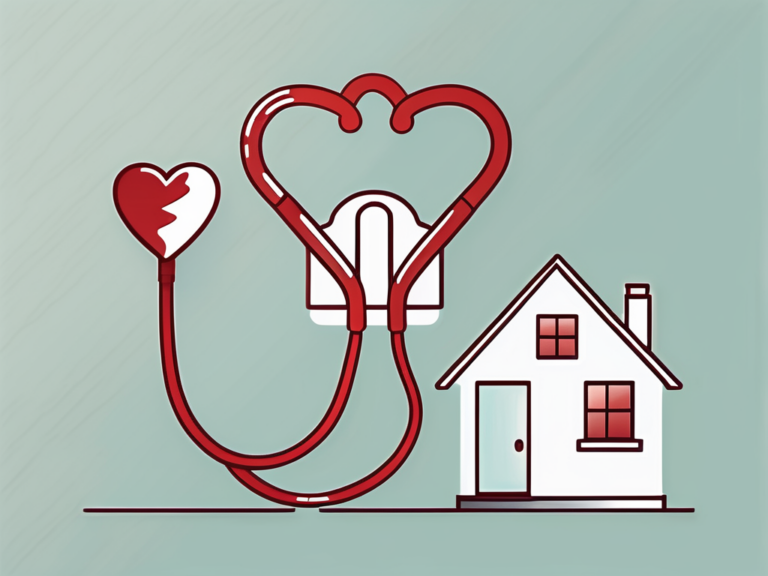How Can I Check My Heart at Home?
In today’s fast-paced world, taking care of our health has become more important than ever. One of the key aspects of a healthy lifestyle is maintaining a strong and healthy heart. Your heart is a tireless worker, tirelessly pumping blood throughout your body, supplying oxygen and nutrients to every cell. It is essential to regularly monitor the condition of your heart to ensure its optimal functioning. Luckily, there are several simple techniques you can use to check your heart health from the comfort of your own home. In this article, we will explore these techniques and provide valuable insights into maintaining a healthy heart.
Understanding the Importance of Heart Health
The heart plays a vital role in the human body. It is a powerful organ that beats approximately 100,000 times a day, ensuring blood circulation and keeping our organs functioning correctly. Unfortunately, heart diseases have become a global health concern, affecting millions of people. By understanding the significance of heart health, you can take proactive steps to protect and strengthen your heart.
The Role of the Heart in the Body
The heart serves as a pump, circulating blood throughout the body. It delivers oxygen and nutrients to the organs and tissues, allowing them to function optimally. Additionally, it helps remove waste products and carbon dioxide from our cells. Maintaining a healthy heart promotes overall well-being and helps reduce the risk of cardiovascular diseases.
But did you know that the heart is not just a physical organ? In many cultures, it is also considered the seat of emotions and the center of love. It is often associated with feelings of joy, compassion, and empathy. When we say “I love you with all my heart,” we are not just referring to the physical organ, but also to the deep emotional connection we feel.
Common Heart Diseases and Their Symptoms
Heart diseases come in various forms and can have severe consequences if left untreated. Familiarizing yourself with common heart conditions and their symptoms is crucial in early detection and timely medical intervention. Some common heart diseases include coronary artery disease, heart failure, arrhythmias, and heart valve problems. Symptoms may include chest pain, shortness of breath, irregular heartbeat, and fatigue. If you experience any of these symptoms, it is important to consult a healthcare professional.
It’s important to note that heart diseases can affect anyone, regardless of age or gender. While certain risk factors such as smoking, high blood pressure, and a sedentary lifestyle can increase the likelihood of developing heart problems, it’s crucial to remember that even seemingly healthy individuals can be at risk. Regular check-ups, a balanced diet, exercise, and stress management are all essential in maintaining a healthy heart.
Basic Heart Check Techniques at Home
Performing regular heart checks at home can provide valuable information about your cardiovascular health. Here are two simple techniques you can use to assess your heart’s condition:
Listening to Your Heartbeat
Find a quiet and peaceful place in your home. Sit down and place your index and middle fingers lightly on your wrist or the side of your neck, just below the jawline. This will help you locate your pulse. Pay attention to the rhythm and regularity of your heartbeat. A normal resting heart rate for adults is typically between 60 and 100 beats per minute. If you notice any significant irregularities or abnormalities, it is advisable to consult a healthcare professional for further evaluation.
Checking Your Pulse
Another way to assess your heart health is by checking your pulse rate. You can do this by placing your index and middle fingers on the inner side of your wrist or on the side of your neck, similar to the previous technique. Count the number of beats you feel within a 60-second timeframe. This provides an accurate measure of your heart rate. Remember, everyone’s heart rate is unique, and factors such as age, fitness level, and overall health can affect the results. If you have concerns about your heart rate, it is best to consult with a healthcare professional.
Now that you are familiar with these basic heart check techniques, let’s delve deeper into why they are important. Regularly monitoring your heart’s condition at home allows you to take an active role in your cardiovascular health. By understanding your heart rate and rhythm, you can detect any potential issues early on and seek appropriate medical attention if needed.
Listening to your heartbeat not only helps you assess your heart’s rhythm but also allows you to connect with your body. It can be a moment of self-reflection and mindfulness, as you take the time to focus on the steady beat that keeps you alive. By regularly checking your pulse, you become more attuned to your body’s signals and can notice any changes or deviations from your usual heart rate.
Moreover, these heart check techniques provide you with a sense of empowerment and control over your own health. Being proactive in monitoring your heart health can lead to early detection of potential cardiovascular problems, which can significantly improve outcomes and treatment options. It’s a small step that can make a big difference in your overall well-being.
Remember, while these techniques are helpful in assessing your heart’s condition, they are not a substitute for professional medical advice. If you have any concerns or questions about your heart health, it is always best to consult with a qualified healthcare professional who can provide you with personalized guidance and support.
Utilizing Digital Tools for Heart Check
Advancements in technology have made it possible to monitor our heart health using digital tools. These tools provide additional insights and convenience, empowering individuals to take control of their cardiovascular well-being. Here are two digital options to consider:
Heart Rate Monitoring Apps
In the digital era, smartphones have become an essential part of our lives. Many smartphone apps offer heart rate monitoring features, allowing you to measure and track your heart rate conveniently. These apps use the phone’s camera and flashlight to detect subtle changes in the color of your fingertip as blood flows through it. By simply placing your finger on the camera lens, the app can provide you with real-time heart rate data.
Heart rate monitoring apps can be particularly useful during exercise or when you want to assess your heart rate in different situations. For example, you can use these apps to monitor your heart rate before, during, and after a workout session to ensure you are within your target heart rate zone. Additionally, some apps allow you to set personalized heart rate goals and track your progress over time.
While these apps can provide useful information, it’s important to remember that they are not a substitute for professional medical advice. Always consult with a healthcare professional if you have concerns about your heart health. They can help interpret the data from these apps and provide personalized recommendations based on your individual circumstances.
Home Use ECG Devices
For a more comprehensive assessment of your heart’s electrical activity, you may consider using a home use ECG (electrocardiogram) device. These compact devices can record the electrical signals produced by your heart, providing detailed information about its rhythm and rate. By placing the device’s electrodes on your chest or wrists, you can capture an ECG reading within seconds.
Home use ECG devices are particularly beneficial for individuals with existing heart conditions or those at higher risk. They allow you to monitor your heart’s electrical activity regularly and detect any abnormalities or irregularities. Some devices even offer features like arrhythmia detection, which can alert you if your heart rhythm deviates from the normal range.
Furthermore, these devices often come with companion apps that allow you to store and analyze your ECG readings over time. You can share the recorded data with your healthcare provider for further analysis and discussion during your appointments. This enables a more informed and collaborative approach to managing your heart health.
By utilizing heart rate monitoring apps and home use ECG devices, you can gain valuable insights into your heart health and track changes over time. These digital tools provide a convenient and accessible way to monitor your cardiovascular well-being, empowering you to take proactive steps towards a healthier heart. Remember, while these tools are beneficial, they should always be used in conjunction with professional medical guidance to ensure accurate interpretation and appropriate actions.
Interpreting Your Heart Check Results
Understanding your heart check results is essential in maintaining optimal heart health. Here are two key factors to consider:
What is a Normal Heart Rate?
A normal resting heart rate for adults typically falls between 60 and 100 beats per minute. However, individual variations are common, and factors such as age, fitness level, and overall health can influence the results. Regularly monitoring your heart rate allows you to identify any significant changes and seek medical advice if necessary.
When to Seek Medical Attention
If you experience persistent symptoms such as chest pain, shortness of breath, dizziness, or irregular heartbeats, it is crucial to seek immediate medical attention. While home heart checks can provide helpful insights, they should not replace professional medical evaluation, especially in critical situations.
Now, let’s delve deeper into the topic of heart rate variability (HRV) and its significance in assessing heart health. HRV refers to the variation in time intervals between consecutive heartbeats. It is an essential measure that provides insights into the balance between the sympathetic and parasympathetic nervous systems, which regulate heart function.
Research has shown that higher HRV is associated with better cardiovascular health and overall well-being. A higher HRV indicates that your heart is adaptable and responsive to different situations, such as stress or physical activity. On the other hand, a lower HRV may suggest an imbalance in the autonomic nervous system, which could be indicative of underlying health issues.
Monitoring your HRV can help you identify patterns and trends in your heart’s response to various stimuli. By tracking your HRV over time, you can gain valuable insights into how your body is adapting to stress, exercise, and other factors that influence heart health. This information can empower you to make informed decisions about your lifestyle and seek appropriate medical guidance when needed.
Maintaining Heart Health at Home
Ensuring a healthy lifestyle is vital for maintaining a strong heart. While heart checks provide valuable information, it is equally important to incorporate heart-healthy habits into your daily routine. Here are two essential aspects to consider:
Heart-Healthy Diet Tips
Eating a well-balanced diet plays a significant role in keeping your heart healthy. Incorporate plenty of fruits, vegetables, whole grains, lean proteins, and healthy fats into your meals. These nutrient-rich foods provide essential vitamins, minerals, and antioxidants that support optimal heart function. For example, berries are packed with heart-protective antioxidants, while salmon is an excellent source of omega-3 fatty acids, which can help reduce inflammation and lower the risk of heart disease.
Additionally, limit your intake of processed foods, salt, and sugary beverages. These items are often high in unhealthy fats, added sugars, and sodium, which can contribute to high blood pressure, obesity, and other risk factors for heart disease. Instead, opt for homemade meals using fresh ingredients and flavor-enhancing herbs and spices. By making small changes to your diet, you can make a big difference in your heart health.
Exercises for a Strong Heart
Regular physical activity is crucial for maintaining a strong and healthy heart. Engaging in aerobic exercises such as brisk walking, jogging, cycling, or swimming helps improve cardiovascular fitness. These activities increase your heart rate, strengthen your heart muscles, and improve blood circulation throughout your body.
Aim for at least 150 minutes of moderate-intensity exercise or 75 minutes of vigorous-intensity exercise every week. You can break it down into smaller sessions of 30 minutes, five days a week, or find activities that you enjoy and can incorporate into your daily routine. Remember to start slowly if you’re new to exercise and gradually increase the intensity and duration over time.
Consult with your healthcare professional before starting any exercise regimen, especially if you have any underlying health conditions or concerns. They can provide personalized recommendations based on your individual needs and help you establish an exercise plan that is safe and effective for your heart health.
Frequently Asked Questions About Heart Health
Here are the answers to some commonly asked questions about heart health:
Can Stress Affect My Heart Health?
Yes, chronic stress can impact your heart health. Prolonged stress can elevate blood pressure, increase the risk of heart diseases, and lead to unhealthy coping mechanisms such as overeating or smoking. Managing stress through relaxation techniques, exercise, and seeking social support can help protect your heart.
How Does Age Impact Heart Health?
As we age, our heart also undergoes changes. Blood vessels may become stiffer, increasing the risk of high blood pressure and other cardiovascular issues. Regular heart checks and a healthy lifestyle are particularly important as we get older to maintain optimal heart health.
But age is not the only factor that can impact heart health. Other lifestyle choices, such as diet and exercise, also play a crucial role. A diet high in saturated fats and cholesterol can lead to the buildup of plaque in the arteries, increasing the risk of heart disease. On the other hand, regular physical activity can help strengthen the heart muscle and improve overall cardiovascular health.
Furthermore, genetics can also influence heart health. If you have a family history of heart disease, you may be at a higher risk. It’s important to be aware of your family’s medical history and discuss it with your healthcare provider to determine the best course of action for maintaining a healthy heart.
In conclusion, taking the time to check your heart health is an essential step in maintaining a healthy lifestyle. By understanding the importance of heart health, utilizing simple techniques, utilizing digital tools, interpreting the results, and adopting heart-healthy habits at home, you can stay on top of your cardiovascular well-being. Remember, your heart is a precious organ that deserves the utmost care. Take the necessary steps today to keep your heart healthy and strong for years to come.






